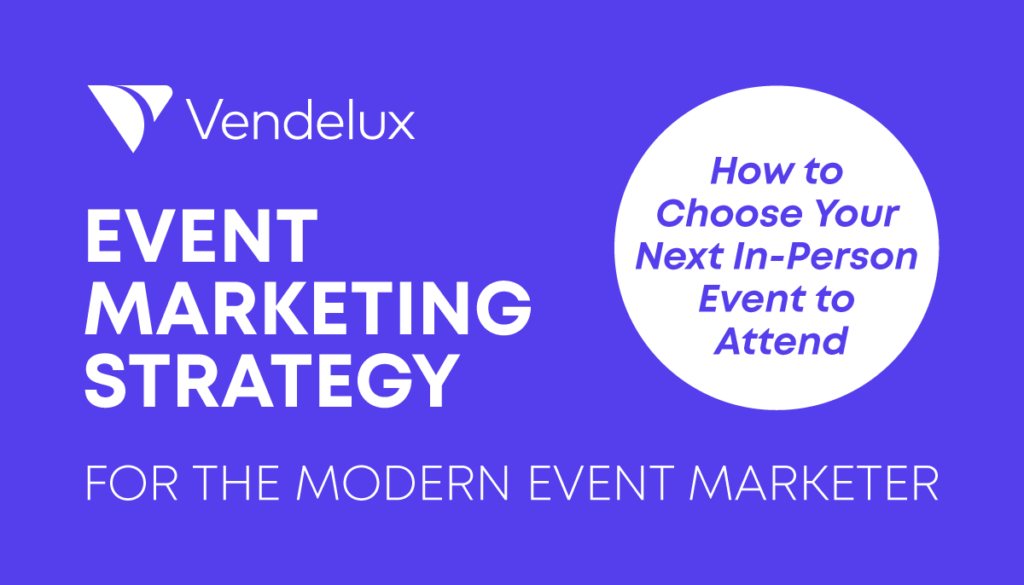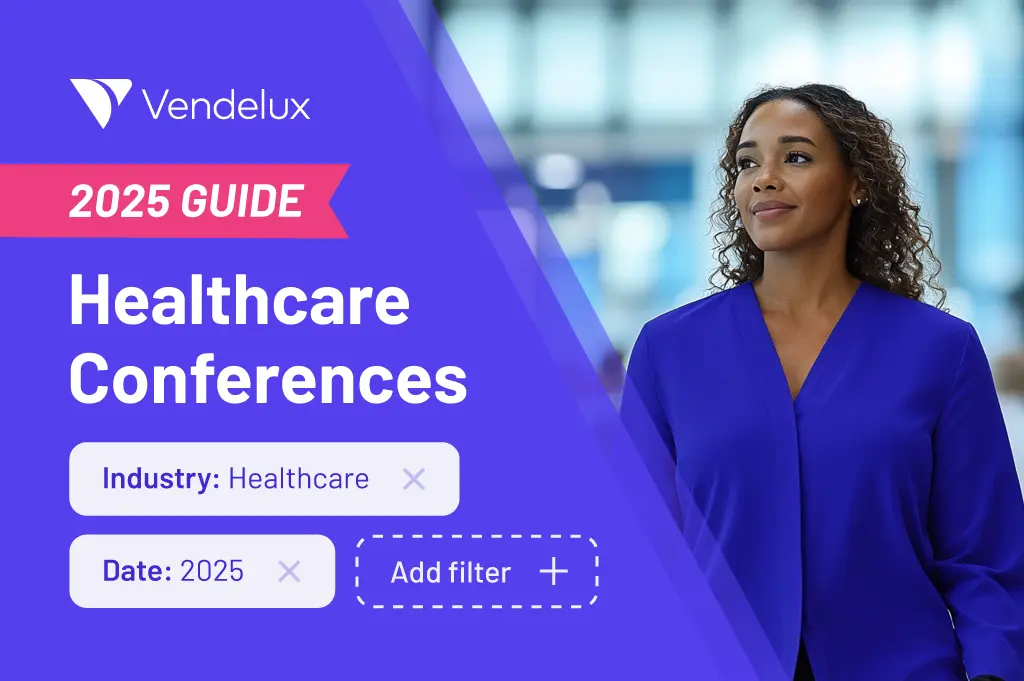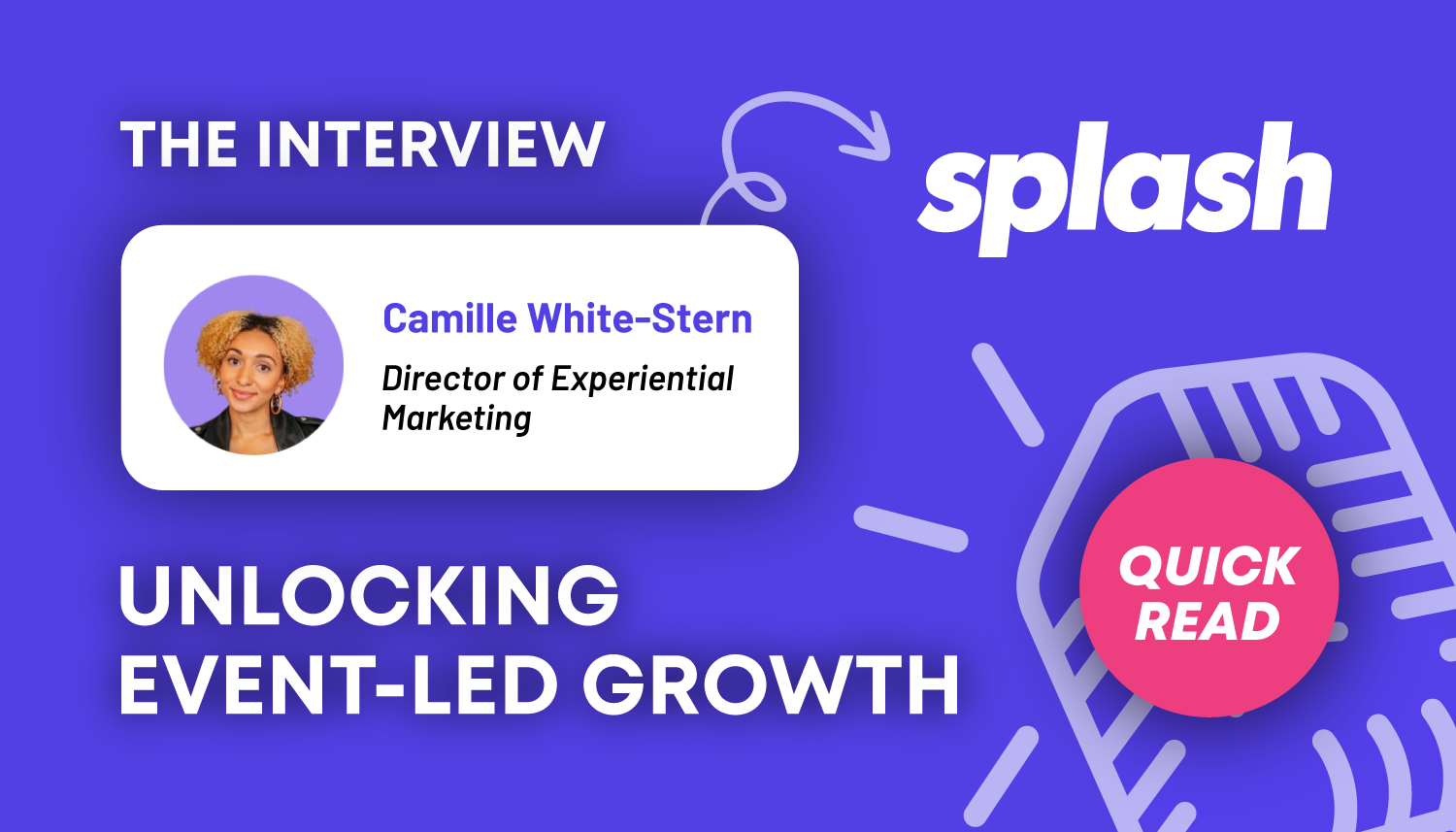In-person b2b events are back and with a boom. If the pandemic has taught us anything it’s that virtual events can work to help businesses reach new audiences. However, many marketers will be rejoicing at the chance to network and experience events IRL again.
In fact, when asked what kind of events they’d like moving forward, 42% of people in the US said they’d only attend in-person events, 52% said they’d prefer hybrid and only 6% were interested in sticking with online events.
While we believe that virtual events are here to stay and can be hugely beneficial for both organizers and attendees, it appears the majority are sick of meeting people through their laptop screens!
With the world returning to in-person events, many companies will be rethinking their event strategy. For event marketers, attending or sponsoring B2B events can be expensive.
Instead of signing up to every event you see, you need to create a strategy to ensure you get the best return on investment (ROI). So, where do you start? Let’s take a look.
How Event Marketing Has Changed
The landscape of event marketing has undergone a significant transformation, especially in the wake of technological advancements and shifting audience preferences. This evolution is evident in several key areas, impacting how marketers approach and execute their strategies.
Embracing the Digital World
In an increasingly digital world, virtual and hybrid events have risen to prominence. The shift towards these formats has not only been a response to global challenges but also a reflection of changing preferences among event attendees.
Virtual event marketing has expanded the reach of events, allowing people from different geographical locations to participate without the constraints of travel. This has opened up new opportunities for targeting a broader audience.
Social Media Integration
Social media has become an integral part of event marketing strategies. From generating buzz about an upcoming event to engaging with potential attendees, platforms like Facebook, Twitter, and LinkedIn play a crucial role.
The use of event hashtags and live updates has become commonplace, enhancing attendee engagement and boosting brand awareness. User-generated content, such as posts and stories shared by attendees, further amplifies the event’s reach and impact.
Personalization and Audience Engagement
The modern event marketing plan places a strong emphasis on personalization. Understanding the pain points and preferences of your target audience allows for a more tailored event experience.
This approach not only increases attendee satisfaction but also boosts the chances of a successful event marketing outcome.
Data-Driven Strategies
The use of event marketing software and analytics tools has become more prevalent. These tools help marketers make informed decisions based on event statistics and attendee behaviors.
By analyzing data from previous events, marketers can refine their strategies to better align with their marketing goals and ensure a more effective marketing strategy.
Integration of Marketing and Sales
A key change within events marketing is the closer alignment between marketing and sales teams. This collaboration ensures that the event strategy is cohesive and that both teams work towards common event goals.
By sharing insights and materials, they can create a unified front that enhances the overall effectiveness of the event.
The Rise of Content Marketing
Content marketing has become an essential component of event marketing campaigns. This includes everything from the event website to email marketing and press releases.
The content created helps in promoting the event, engaging with potential attendees, and reinforcing the event branding.
Focus on ROI and Event Success
Event marketers are now more focused than ever on measuring the return on investment (ROI) of their efforts.
This includes tracking ticket sales, event attendance, and post-event surveys to assess attendee satisfaction. These metrics help in understanding the direct impact of event marketing efforts on overall business objectives.
Event Experience and Branding
Creating an immersive and memorable event experience has become paramount. This involves careful event planning, from the event’s theme and schedule to the finer details like the registration page and event branding.
A successful event marketing strategy today goes beyond just hosting events; it’s about creating experiences that resonate with attendees and encourage them to engage with the brand.
Future Events Trends
Looking ahead, we can expect event marketing to continue evolving. Hybrid events are likely to become a staple, blending the best of in-person and virtual experiences.
Additionally, digital marketing techniques, including paid promotion and social media marketing, will become more sophisticated, offering new ways to promote events and connect with audiences.
The key to successful event marketing in this dynamic environment is adaptability and a willingness to embrace new technologies and marketing trends.
By staying attuned to these changes, marketers can ensure that their event marketing strategies remain effective and relevant, regardless of the format or audience of their next event.
The Benefits of a Good Event Marketing Strategy
A well-crafted event marketing strategy is more than just a plan for organizing an event; it’s a comprehensive approach that brings numerous benefits to your organization. Here are some of the key advantages:
1. Effective Targeting and Networking
A good strategy enables event marketers to identify and attend events that are most likely to attract their target audience.
This precision targeting ensures that networking efforts are focused, allowing marketers to connect with potential leads, partners, and industry influencers who are relevant to their business goals.
2. Maximizing Return on Investment (ROI)
Attending events can be costly, considering travel, accommodation, and event fees. A strategic approach ensures that each event attended offers the highest potential for ROI, whether through lead generation, networking opportunities, or brand exposure.
This helps in allocating resources more efficiently and justifying the investment in event attendance.
3. Strengthening Brand Representation
An event marketer represents their brand at every event they attend. A well-planned strategy ensures that they are equipped with the necessary information, materials, and training to effectively communicate the brand’s message, ethos, and value proposition.
4. Gaining Competitive Insights
Attending events with a clear strategy in place allows marketers to gather competitive intelligence. They can observe and learn from competitors’ presentations, booths, and interactions with attendees, gaining insights that can be used to refine their own marketing strategies.
5. Personal Development and Industry Knowledge
By strategically choosing which events to attend, marketers can focus on those that offer the most valuable learning experiences and industry insights. This continuous personal and professional development keeps them abreast of the latest trends and best practices in their field.
6. Enhancing Content Creation
Events are a goldmine for content creation, and a strategic approach helps in planning and capturing content that can be used in various marketing channels. This includes live social media updates, post-event blogs, and testimonials, which are essential for engaging with a wider audience.
7. Building Long-Term Relationships
Effective event marketing strategies often include follow-up plans post-event. This helps in maintaining and nurturing relationships initiated at events, turning one-time interactions into long-term business relationships.
8. Efficient Time Management
With a clear strategy, event marketers can plan their time at events more effectively. They can prioritize which sessions to attend, whom to network with, and how to divide their time between different event activities, ensuring a productive experience.
9. Showcasing Thought Leadership
Participating in panel discussions, giving presentations, or even engaging in informal conversations at events are opportunities to establish oneself and their brand as thought leaders. A strategic approach includes identifying and preparing for these opportunities to share expertise and insights.
10. Measuring Success
A strategic approach allows for the setting of clear, measurable goals for each event attended. This could range from the number of leads generated to the quality of connections made. Post-event analysis against these metrics helps in evaluating success and informing future strategies.
How to Make an Event Marketing Strategy
Crafting an event marketing strategy is as crucial as formulating any other aspect of your marketing plan, like content or ad strategies.
Given the significant investment and potential for driving B2B leads, events shouldn’t be overlooked.
Just as you wouldn’t impulsively spend $2,000 on a Google Search campaign without a solid strategy, the same level of planning and consideration should apply to event marketing, whether it’s for in-person, virtual, or hybrid events.
The goal of an effective event marketing strategy is to pinpoint and participate in events that promise the highest return on investment. This involves selecting events that align with your target audience and present opportunities to enhance your brand’s visibility and networking prospects.
A successful event marketing plan encompasses everything from pre-event preparations like social media promotion and creating buzz on your event website, to engaging potential attendees and optimizing ticket sales.
Key elements of a robust event marketing strategy include detailed planning for event branding, employing event marketing software, and leveraging digital marketing techniques like paid ads and email marketing.
It’s about creating an immersive event experience that resonates with attendees and meets your event goals.
Post-event activities like surveys and social media engagements are also vital to gauge attendee satisfaction and inform future event marketing efforts.
By integrating these components, event marketers can ensure event success, build brand awareness, and effectively promote their upcoming events.
The first step is how you prep.
Pre Event Research
Before you consider any events you need to do your research!
For a few reasons.
First, is that as marketers we’re brand guardians, so you need to make sure that the event and the company running it are aligned with your organization’s values.
Secondly, the event content, keynotes, sponsors and attendees need to line up with your organization and marketing goals. Chances are, by attending events with speakers and content similar to yours, you set yourself up to:
1. Find the right target audience who are interested in the content you’re already talking about and;
2. Your team is well equipped to spark up conversation on the topic and appear like experts to potential leads.
We’d recommend creating a list of events that are aligned with your company’s industry, ethos, messaging, and content. Once you’ve created a shortlist, use an event intelligence tool like Vendelux, to do your due diligence on whether or not attendees fit your target market.
With Vendelux there’s also the ability to reverse engineer. You can search by attendee name, upload a CSV list of contacts or even connect your CRM to analyze leads and accounts and add matches to your prospect list.
Vendelux saves you time and energy, by compiling event data for you. Find out attendee details like: their company, job title and even their name, so you can whittle your list down to events that will be most beneficial to you.
The same approach applies for agreeing sponsorship packages. Make sure you get your brand in front of the right people, by doing thorough research, or using Vendelux to do it for you. That way, you increase your chances of interacting with qualified leads.
Event Marketing Plan and Calendar
Once you’ve done your research, you now know what events are aligned with your B2B marketing strategy and your goals.
The next step is to map out who from your team will go to which event, on which date, location, etc. Plan this in a shared event calendar, so the whole team is kept in the loop.
When you’ve created your event calendar, it’s important to set goals and an event strategy for those who will attend from your company. Take your marketing funnel and adapt it for each event. For example:
Step one – Awareness:
Increase awareness of your company by engaging about the event in your content and social media. For example, plan social media content that tells your audience and competitors that you’ll be there, speaking at or sponsoring the event.
Invite those who’ll also attend to comment and engage with your company online before meeting you in real life. Research members of your target audience who’ll be there and see if they’ve mentioned any keynotes they can’t wait to see, so your team can go to those too.
Step two – Interest:
Prepare how you’ll catch your audience’s interest. For example, pre-arrange topic areas for discussions with your target audience. Tailor this to the different audience and event. And always make sure your team has an elevator pitch that they memorize and are aligned on.
Step three – Consideration:
Think of creative field marketing ideas you can use to make your company more memorable. Maybe it’s a useful or funny object with a QR code that links to their personal LinkedIn. All employees that attend should have business cards, brochures or any other keepsake they can hand to potential prospects.
Whatever you choose, it needs to be as easy as possible for prospects to contact you, to move from consideration to conversion.
Top tip:
Possibly the most important stage in this whole process is to plan what lead capturing process you’ll use. How will you make sure any potential leads are not lost? Add this into your plan to ensure you’ve thought of every step and are ready to nurture leads straight after the event.
Step four – Conversion:
The last part of your plan should be your post-event follow up. You’ve done the hard part of generating potential leads, but no one is making a deal on the spot, so how will you turn them from a prospect to lead? How will you re-engage after the event?
Create a pitch and outreach plan that will help you stand out from the crowd and seal the deal. For example, maybe you noted down an interesting discussion you had with a potential lead.
In your follow up email, you find new information on it and add to the discussion, giving them value and positioning your company as an expert on that topic.
Top tip:
Part of the conversion stage that you shouldn’t miss is the post-event content. Make sure to send company representatives who are happy to be in photos, and post updates from the event during and after. If your audience is B2B it might take longer to convert leads.
By sharing insights and engaging online through your social media and content channels, you stay top of mind for these companies. Which could help push a deal over the line.
Align Sales and Marketing
Consider this: 68% of B2B marketers say in-person events generate the most leads.
When companies attend B2B marketing events they usually choose to send sales and marketing. But also according to research, 55% of marketers don’t know what materials sales teams will use at these events. Teams who are not aligned, are getting in the way of their own results.
As mentioned previously, having a solid plan for every step of the event is essential to producing great ROI. This means that sales and marketing have to be completely aligned on the plan, event strategy and materials needed to reach your goals.
To ensure both teams are on the same page, both departments should be involved in the event marketing strategy, from start to finish.
Regardless of who attends the in person event, your event marketing strategy should ensure a smooth transition from marketing qualified leads to sales discussions.
Use a Tool to Find the Best Events
Creating a solid event marketing strategy can take time and a lot of energy to build.
In fact, you should already be planning and creating your strategy for the next year!
It’s best to get in early on these events, especially if you want to secure one of those coveted sponsorship positions at the top events.
To make sure that you’re making the right decisions, use a data-driven tool to help. Vendelux is an event intelligence platform built to give B2B event marketers every bit of information they need to attend the right events for their goals.
Simply search and filter up to 30,000 events worldwide, and get information on not only the event, price and sponsorship information, but also details on each attendee. Sound too good to be true? See it for yourself.




